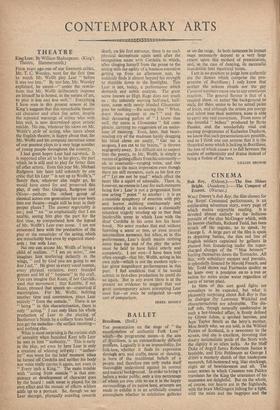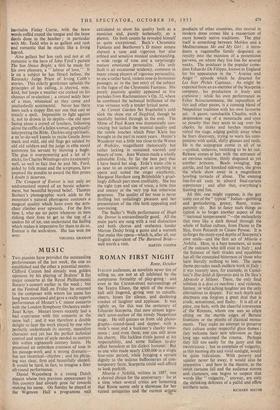CINEMA
Rob Roy. (Odeon.) The Sun Shines Bright. (Academy.) The Conquest of Everest. (Warner.)
WALT DISNEY'S Rob Roy, the film chosen for the Royal Command performance, is an exhilarating adventure story, every page of
which makes enjoyable reading. It is devoted almost entirely to the bellicose pursuits of the clan McGregor which, with its bonnie chieftain, Richard Todd, has been struck off the register, so to speak, by George 1. A large part of the film is spent in depicting battles, the thin red line of English soldiers captained by gallants in plumed hats foundering under the super- charged charges of the " blue bonnets" hurling themselves down the Trossachs. All this, with subsidiary escapes and pursuits, is splendidly directed by Harold French, and Mr. Todd shows real Fairbanks quality as he leaps over a precipice on to a tree or swims for miles under water regardless of yards of tartan plaid.
In films of this sort good fights are nowadays to be expected, but what is pleasantly surprising about Rob Roy is that its dialogue (by Lawrence Watkins) and characterisations are admirable. The dis- taff side, though naturally unobtrusive in such a hot-blooded affair, is firmly defined by Glynis Johns, a spirited heroine, and Jean Taylor Smith as the hero's. mother. Miss Smith who, we are told, is the Wilfred Pickles of Scotland, is a newcomer to the screen, and she is excellent, investing that dreary nationalistic pride of the Scots with the dignity it so often lacks. As the bluff Duke of Argyll James Robertson Justice is laudable, and Eric Pohlmann as George I draws a masterly sketch of that inadequate monarch, full-bottomed wig, lilac stockings, slight air of bewilderment and all. The court scenes in which Countess von Pahlen translates for the King the utterances of his statesmen are delightful. But on the whole, of course, our hearts are in the highlands, with the braw McGregors itching for a fight, with the mists and the bagpipes and the
inevitable Finlay Currie, with the braw words rolled round the tongue and the braw deeds done in the heather ; in particular with Mr. Todd who is so gallant and rash and romantic that he stands like a living legend.
Also gallant but less rash and not at all romantic is the hero of John Ford's picture The Sun Shines Bright, a film he made for his own pleasure, a " labour of love." It is on a subject he has filmed before, the Kentucky Judge Priest of Irving Cobb's stories. This elderly gentleman upholds the principles of his calling, is shrewd, wise, kind, but keeps a weather eye cocked on his chances of re-election ; a rotund teddy bear of a man, whimsical as they come and unabashedly sentimental. Never has there been such a sloppy film nor one that cast so treacly a spell. Impossible to fight against it, not to drown in its depths—the old man facing alone a crowd of lynchers, following alone the coffin of a fallen woman, graphically interpreting the Bible. Darkies sing spirituals, a ne'er-do-well kneels to recite Gentle Jesus meek and mild, old old flags get saluted by old old soldiers and the judge in elfin mood summons his servant by blowing a bugle. The glue is overpowering and a lot of it sticks, for Charles Winninger stirs i t extremely well, so well in fact that he and Mr. Ford, aided by folk music and the scriptures, have inspired the pundits to award the film prizes I doubt it deserves.
The Conquest of Everest is not only an undramatised record of an heroic achieve- ment, but beautiful beyond belief. Thomas Stobart's photographic work adds to the mountain's natural photogenic contours a magical quality which lures even the arm- chair climber ever upwards. For the first time I, who see no point whatever in men risking their lives to get to the top of a useless bit of ice, can understand the feeling which makes it imperative for them to do so. Everest is the arch-siren. She has won me
over. VIRGINIA GRAHAM



































 Previous page
Previous page